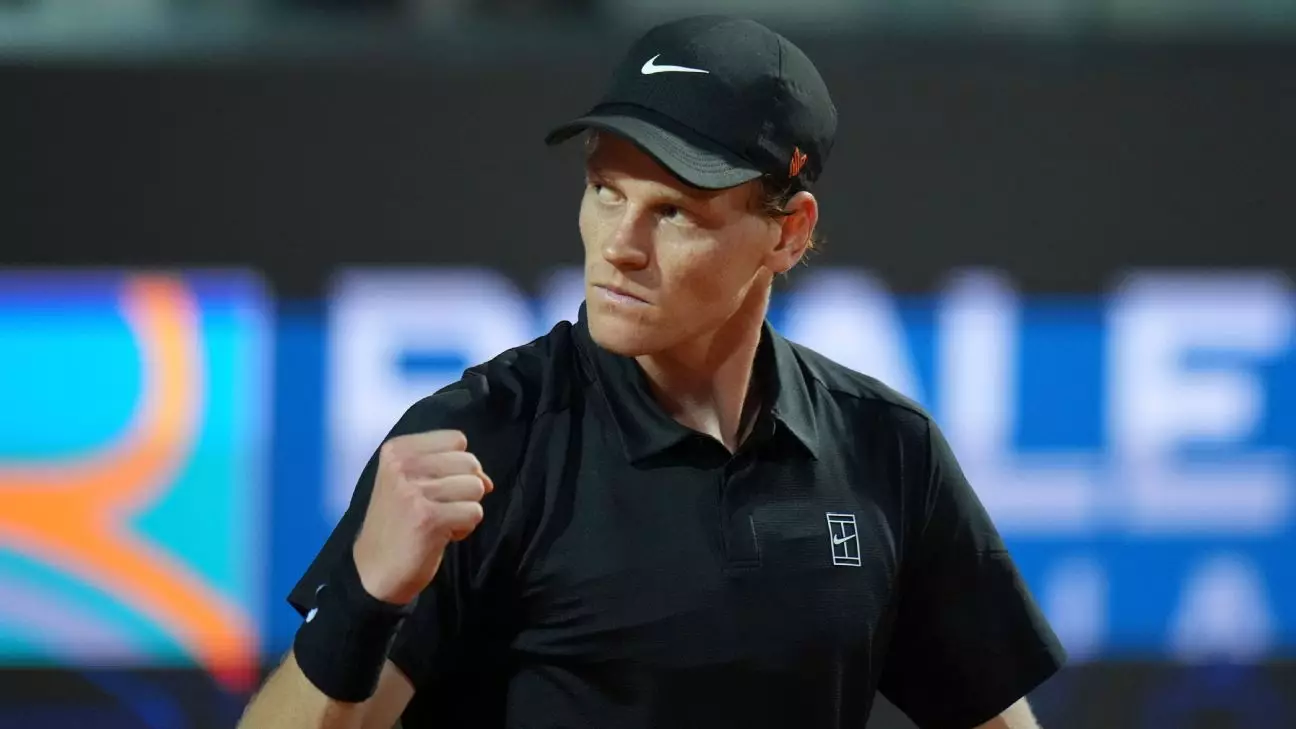After a lengthy absence that lasted over 100 days, Jannik Sinner made headlines once again, demonstrating that his spirit is as unyielding as his talent. The Italian tennis sensation emerged victorious from his doping suspension with a commanding 6-3, 6-4 win against Mariano Navone, ranked 99th in the world. This match, held at the iconic Italian Open, marked Sinner’s return to competitive tennis after his last appearance at the Australian Open where he secured his third Grand Slam title. The excitement surrounding his homecoming was palpable, with fans rallying behind him in droves, dressed in his signature color, orange, and demonstrating unwavering support.
Sinner faced a complex psychological journey during his hiatus—a reality less understood by casual fans. His acknowledgment of self-doubt before stepping onto the court resonated with many. “It’s normal to have doubts,” he stated. This popularity and relatability stem not just from his prowess in the sport, but also from his candid reflection on the anxieties that accompany pressure and expectation. This genuine discourse places Sinner in a class of athletes who embody not just skill, but a deeper emotional intelligence.
Flashes of Brilliance Amidst Uncertainty
As the match unfolded, Sinner showcased flashes of the brilliance that catapulted him to the top ranks of tennis. His ability to generate enormous power and precision on his groundstrokes was evident as he moved fluidly around the court, eliciting cheers and admiration from the crowd. The atmosphere was electric; with each powerful stroke, Sinner reasserted his dominance and reminded spectators of why he’s a force to be reckoned with in the sport.
The crowd support played a pivotal role in Sinner’s performance. Spectators chanting “Ale, Ale, Ale, Sin-ner” turned the Campo Centrale into a cauldron of enthusiasm. The shared experience of community and collective hope served not only as motivation for Sinner but also as an essential reminder of the importance of fan engagement in sports. Sinner’s remarks about the crowd further demonstrated his appreciation and acknowledgment of their presence, enhancing the emotional resonance of the match for both players and fans.
Handling Pressure and Performance Post-Suspension
While much of the focus lay on Sinner’s formidable talent, his recent suspension loomed large over this match. Many in the tennis world have debated the validity of his three-month ban, suggesting it wasn’t harsh enough given the circumstances. Sinner himself exhibited a profound awareness of how deep-rooted perceptions can affect an athlete’s psyche and public persona. Acknowledging that “it doesn’t matter about the result today” shows not just Sinner’s maturity, but an understanding of broader implications surrounding professionalism in sports.
Sinner’s restraint in discussing his ban speaks volumes about his ability to compartmentalize distractions and focus on the task at hand. The dichotomy of triumph and lingering doubts remains a prominent theme in the sports narrative—athletes constantly navigate the fine line of public scrutiny and their personal journey. Sinner’s emotional clarity amidst external controversies is a skill that few athletes possess, enabling him to retain his composure and focus on what he can control: his performance.
The Path Forward: A Journey of Self-Discovery
Looking forward, Sinner has a unique opportunity to shape his narrative as he advances in the tournament. His upcoming matchup against 93rd-ranked Dutch qualifier Jesper De Jong represents not just a challenge on the court, but a chance for Sinner to further solidify his resilience and skill in the face of adversity. The road ahead will undoubtedly test his limits, not just physically, but mentally and emotionally.
The Italian tennis landscape has remained hopeful since the days of Adriano Panatta, the last Italian man to win the Rome title in 1976. Now, Sinner finds himself in a position where he could not only rekindle national pride but also redefine it. With his winning streak extended to 22 matches, dating back to October, Sinner is, without a doubt, an evolving athlete worth investing in emotionally. His journey is a compelling narrative of resilience, authenticity, and the unyielding pursuit of excellence.
Jannik Sinner is more than just a tennis player; he is a beacon of perseverance, a testament to the powerful marriage of talent and hard work, and an athlete striving to carve his legacy against all odds. His journey is just beginning, and it promises to be one filled with excitement, passion, and perhaps, redemption.

